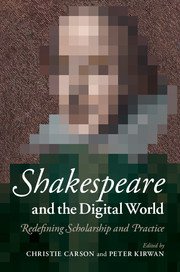Shakespeare and the Digital World: Lost in the cloud?
Shakespeare and the Digital World: When scholarship meets global capitalism, a talk by Christie Carson
Dr Seng Tee Lee Conference Room, Senate House Library
Thursday 15 September 2016
Review by Emily-Kate Stuart
 Thursday night’s final lecture in the
Metamorphosis series held at Senate House Library,
which has charted Shakespeare from young boy to oblivion,
saw Christie Carson assess the value of the digitalised
Bard. As Carson acknowledged the recent livestream of Emma
Rice’s revamped A Midsummer Night’s Dream, her
impressive dedication to keep up to date with the Bard’s
digital journey was clear. From text to television screen, a
free 60 day online broadcast could not be further from the
traditional spontaneity of theatre and performance so loved
and so integral to Shakespeare’s work; an unforgiving
digital recording which remains in the cloud forever, a
striking alternative.
Thursday night’s final lecture in the
Metamorphosis series held at Senate House Library,
which has charted Shakespeare from young boy to oblivion,
saw Christie Carson assess the value of the digitalised
Bard. As Carson acknowledged the recent livestream of Emma
Rice’s revamped A Midsummer Night’s Dream, her
impressive dedication to keep up to date with the Bard’s
digital journey was clear. From text to television screen, a
free 60 day online broadcast could not be further from the
traditional spontaneity of theatre and performance so loved
and so integral to Shakespeare’s work; an unforgiving
digital recording which remains in the cloud forever, a
striking alternative.
However, Carson saw the ‘democratising of audience’ and a widened theatrical community as the virtuous products of modern innovation, seeing the expansion of Shakespeare’s audience into environments of poverty, war and natural disaster as the Bard’s ‘disappearance’ into the online sphere. The audience identified that the diminishing value of the written world and the dismantling of the arts into a commercial product were lingering vices. Perhaps the impact of her lecture went beyond that of Shakespeare alone as she asked, ‘do we know more about the technology we use than the subjects we research?’
Carson similarly recognised the altered overall viewing experience of a Shakespeare play in performance as well as the resulting changes to the nature and practice of education, by the digital. A bold comparison between Emma Rice and Theresa May served to illustrate what Carson saw as a collision between conservatism (Shakespeare) and experimentation (the digital) in expanding Shakespeare’s reach to ‘the extremities of the skies’. Yet, she also identified a potentially harrowing endeavour behind the canon’s digital expansion. As a ‘renewable, uniquely British resource’ does the digitalisation of the Bard have British supremacy at its end with Shakespeare as colonial civiliser, rather than an attempt to widen the audience and expand the theatrical community? Carson’s discussion was both politically charged and socially concerned, far reaching and close to home.
Yet, while the discussion offered a fresh approach to Shakespeare’s legacy and remained current in tackling a subject so alien from its pen and paper roots, Carson was reluctant to assess the effects of increasing digitalisation. Most of the lecture dwelt on the current digital forms the canon has taken and less on the consequences of this. Perhaps Carson felt the need to focus on the relationship between Shakespeare and the digital in the here and now, with little time for consequence, before this volatile relationship undergoes drastic and extensive change with little delay? Carson’s lecture saw a dedication to progression hark back to the magic of a nostalgic past, unable to conclude whether digitalisation is a labour of love or of loss for our untiring genius.

